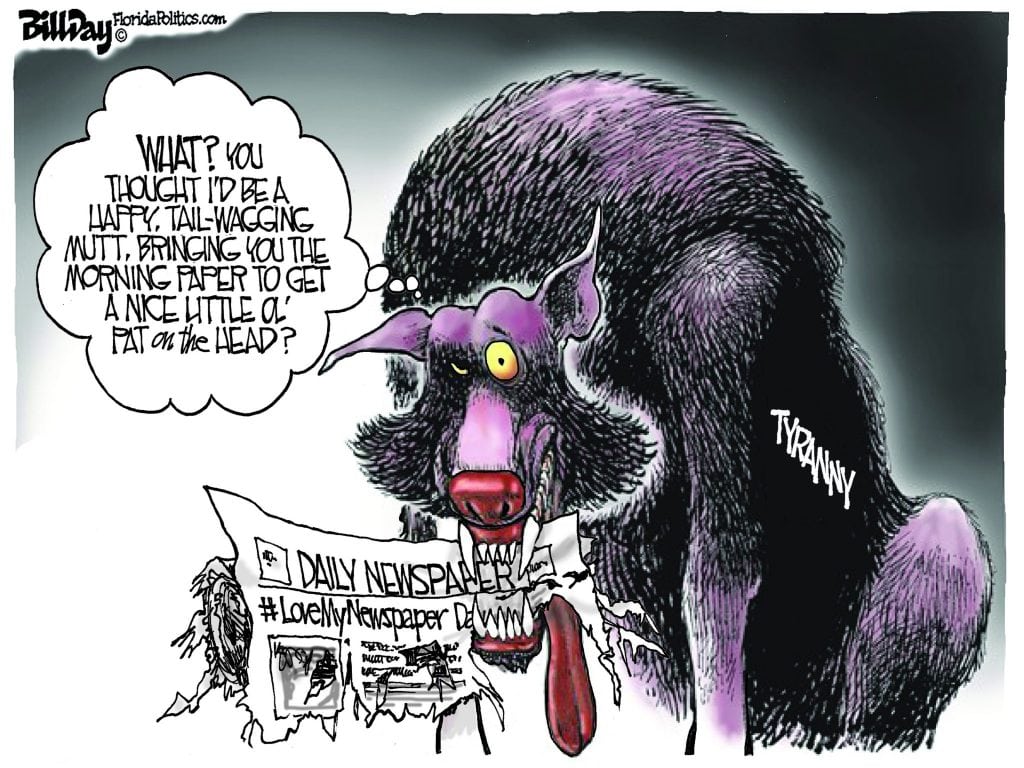BY DAVID PERRYMAN
 Of the dozen or so newspapers and magazines that my parents subscribed to, my favorite was The Saturday Evening Post. The Post contained short stories and a few current events, but its main attraction to me was the artwork – and most influential was the art of Norman Rockwell.
Of the dozen or so newspapers and magazines that my parents subscribed to, my favorite was The Saturday Evening Post. The Post contained short stories and a few current events, but its main attraction to me was the artwork – and most influential was the art of Norman Rockwell.
Hanging today on the wall in my law office is a series of Rockwell prints aptly named The Four Freedoms. The paintings are the artist’s interpretation of Freedom of Speech, Freedom of Religion, Freedom from Want and Freedom from Fear.
Rockwell’s Four Freedoms was painted in 1943 during the height of World War II and gave the American people exactly what they needed during a period when doubt could have easily given way to fear. The freedoms illustrated by one of our country’s most beloved artists remind us of the freedoms that we are guaranteed by our constitutional Bill of Rights.
The very first amendment to our Constitution says, “Congress shall make no law respecting the establishment of religion, or prohibiting the free exercise thereof, or abridging the freedom of speech, or of the press, or the right of the people peaceably to assemble, and to petition the Government for a redress of grievances.”
Freedom of Religion, Freedom of Speech, Freedom of the Press, Freedom to Assemble, and Freedom to Petition are rights that Congress may not take away.
If these freedoms are truly inalienable, then why is the stage being set to abridge and curtail one of the most important freedoms guaranteed by the First Amendment to the United States Constitution?
In Oklahoma, we take agricultural trade very seriously and we know the economic impact of losing a market. So when the current administration began talking about tariffs on Chinese steel and aluminum, farmers and ranchers held their breath.
We know that American agricultural producers hold the No. 1 slot in China’s agricultural imports, including soybeans, oilseeds, cotton, meats, cereal grains and hay and forage products, totaling more than $94 billion per year.
When China announced that it would place tariffs on 128 products, 94 of which were agricultural in nature, farm groups responded by asking the administration to “consider the impact.”
But it didn’t stop there. Another casualty in the tariff war is newsprint. One small paper manufacturer in Washington state employing only 300 people and owned by a New York–based hedge fund investment group had convinced the current presidential administration to impose tariffs on Canadian newsprint.
Those tariffs now total nearly 32%, and newspapers, directory publishers, book companies and printers of advertising circulars are facing catastrophic circumstances. Perhaps hardest hit are newspapers that are already experiencing industry wide changes in the technology of news distribution.
While larger metropolitan newspapers may well feel the pinch, they are already migrating to electronic distribution and it is likely that smaller daily and weekly papers across the country will find it difficult to pass along the paper price increases to customers. Those smaller publications may ultimately cut print production quantities, shift to smaller page counts and in some cases shut down and lay off workers.
More than 600,000 American jobs in the print media and commercial printing industry are dependent upon Canadian paper.
In an age when the reliability of news gathered from the internet is suspect, there is nothing more reliable than those local and regional papers that have familiar faces that are active participants in your community.
Freedom of the Press is not just an ideal. It is essential to informed citizens and informed voters. While a Free Press is guaranteed by our Constitution, tariffs and other artificial economic factors that are imposed without “considering the impact” may well destroy one of our country’s benchmark freedoms.
–David Perryman, a Chickasha Democrat, represents District 56 in the Oklahoma House








